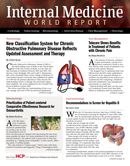Oral Fluoroquinolone Use and Risk of Peripheral Neuropathy
Current users of oral fluoroquinolone (FQs) antibiotics, especially new users of FQs, are at higher risk of developing peripheral neuropathy (PN), concludes a recent study published in Neurology.

Current users of oral fluoroquinolone (FQs) antibiotics, especially new users of FQs, are at higher risk of developing peripheral neuropathy (PN), concludes a recent study published in Neurology.
Although the US Food and Drug Administration (FDA) already addressed the risk of PN on the labeling of all oral FQs following published case reports of PN, this study is the first pharmacoepidemiologic study to quantify risk of FQs and PN in a cohort of older men. Nearly half the reported cases of PN secondary to FQ use have been reported in older men.
Mahyar Etminan, PharmD, of the University of British Columbia, Vancouver, and colleagues conducted a case-control study in a cohort of US men ages 45 to 80 who were followed from 2001 to 2011. Cases were defined as those with the first physician visit diagnosis of PN, polyneuropathy, or drug-induced polyneuropathy. Each case was matched to 4 controls. As a sensitivity analysis, the risk of PN was quantified with use of finasteride (a drug not expected to increase the risk of PN).
Rate ratios (RRs) for current users of FQs were computed using conditional logistic regression adjusted for chronic renal failure, chronic liver disease, hypothyroidism, postherpetic neuralgia, and the use of nitrofurantoin and metronidazole.
The researchers identified 6,226 cases and 24,904 controls. Current users of FQs were at higher risk of developing PN (RR = 1.83; 95% Confidence Interval [CI], 1.49-2.27). The highest risk was found in current new users (RR = 2.07; 95% CI, 1.56-2.74). No risk was found for current users of finasteride.
The investigators concluded that current users, especially new users of FQs, are at a higher risk of developing PN. They recommend that clinicians should weigh the benefits of FQs against the risk of adverse events associated with these frequently prescribed medications.
